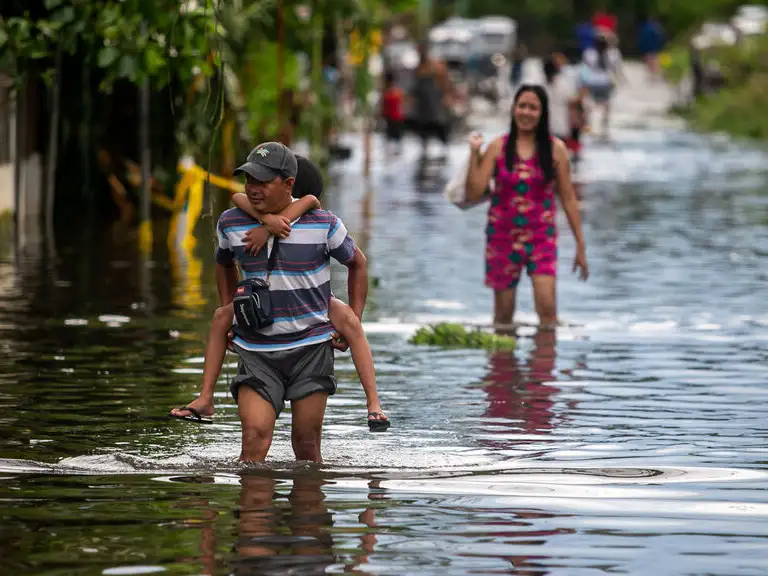Thousands of candidates who stood in the general election heard calls to act on poverty thanks to CAFOD supporters across England and Wales.
Whether via email, at hustings or during doorstep conversations, politicians looking for our votes in constituencies nationwide were asked to commit to support people in the world's poorest communities.
With hundreds of those candidates about to take their seats in Parliament, it's time for words to be turned into action.
We look at the key steps MPs in the new Parliament must take to help us build a better world and address the injustices our global family is facing.
1. Passing a ‘Debt Justice Law’
Almost straight after the last general election, the pandemic pushed dozens of low-income countries – already on the cusp of crisis due to unjust global debt governance and extortionate interest rates – into fully-fledged debt crises.
Governments in some of the world's poorest nations were facing huge additional pressures on their already fragile health systems and needed to provide financial support to people losing their livelihoods due to lockdowns. But at the same time as having to find money for these enormous bills, they were having to pay debts to foreign lenders, including hugely profitable big banks charging exploitative interest rates.
The new global debt crisis continues to force low-income and climate-vulnerable countries to make an impossible choice between spending on essential public services such as health and education and repaying unjust debts to profitable banks.
The new government must change this. And it can. The majority of the contracts that force countries to service these debts – even if their citizens' lives and livelihoods are at stake – are governed by English law. This means that new MPs have a unique opportunity to introduce a 'debt justice law' that would prevent private creditors like HSBC and Blackrock from suing countries that are unable to service debts at the cost of alleviating poverty in their countries.
2. New funding for fighting the climate crisis
Floods in Pakistan, drought in east Africa and heat waves in south and west Asia have shown how the climate crisis is getting worse – with those who've contributed the least to causing it paying the highest cost.
But rich countries, who have been most responsible for the greenhouse gas emissions driving global temperature rises, aren't providing anything like the sums needed to communities that are being hardest hit.
That needs to change.
One way is by working to cancel debts for low-income countries. Countries in the global south are spending five times more on foreign debts than on measures such as flood defences to protect communities most vulnerable to the climate crisis. Cancelling debts would free-up funding for governments to prepare for the next time disaster strikes.
Another way is through new taxes aimed at the richest and largest polluters – not ordinary taxpayers. This would help to reduce emissions by making it more expensive to burn fossil fuels, while raising much-needed funds from companies profiting from damaging our common home.

Fair finance for the climate fightback
Read more about ways the new UK government can help to ensure communities affected by the climate crisis have the finance needed to prepare for climate disasters and rebuild after emergencies.
3. Fixing the food system
Progress to reduce global hunger reversed during the last Parliament, with 2.4 billion people now without regular access to food.
The new UK government must work to fix a global food system which is dominated by a few multinational companies who have pushed for an industrialised approach to agriculture, facilitated by international institutions such as the World Bank. This has reduced the diversity of crops available and sidelined small-scale farmers in low-income countries growing food in ways that care for our common home.
Ministers settling into their new departments in Whitehall must get to work on a new agricultural strategy that supports these small-scale farmers, including by channelling aid money that's currently being used to support big agribusiness companies to support agroecological approaches to food production. They must also work to use the UK’s influence at the World Bank to end policies that force farmers to buy expensive commercial seeds from big businesses, contributing to a food system that is less resilient to the threats posed by the climate emergency.
4. Urgently responding to emergencies
The new UK government is taking office with a record number of people around the world in need of assistance as a result of conflict, disaster and disease.
In Sudan, millions of people forced to escape conflict are running out of food, water and medicine. In Gaza, countless families have also been left homeless, with the United Nations having warned of the threat of famine.
The new government must play its part and act immediately to prevent unnecessary suffering. Ministers can lead the way in diplomacy, engaging international actors in resolving humanitarian crises and ensuring vital aid can reach those in need. They must ensure a greater proportion of the funding the UK provides for emergencies is channelled directly to local organisations, as these are best placed to respond and provide support to people who need it.

